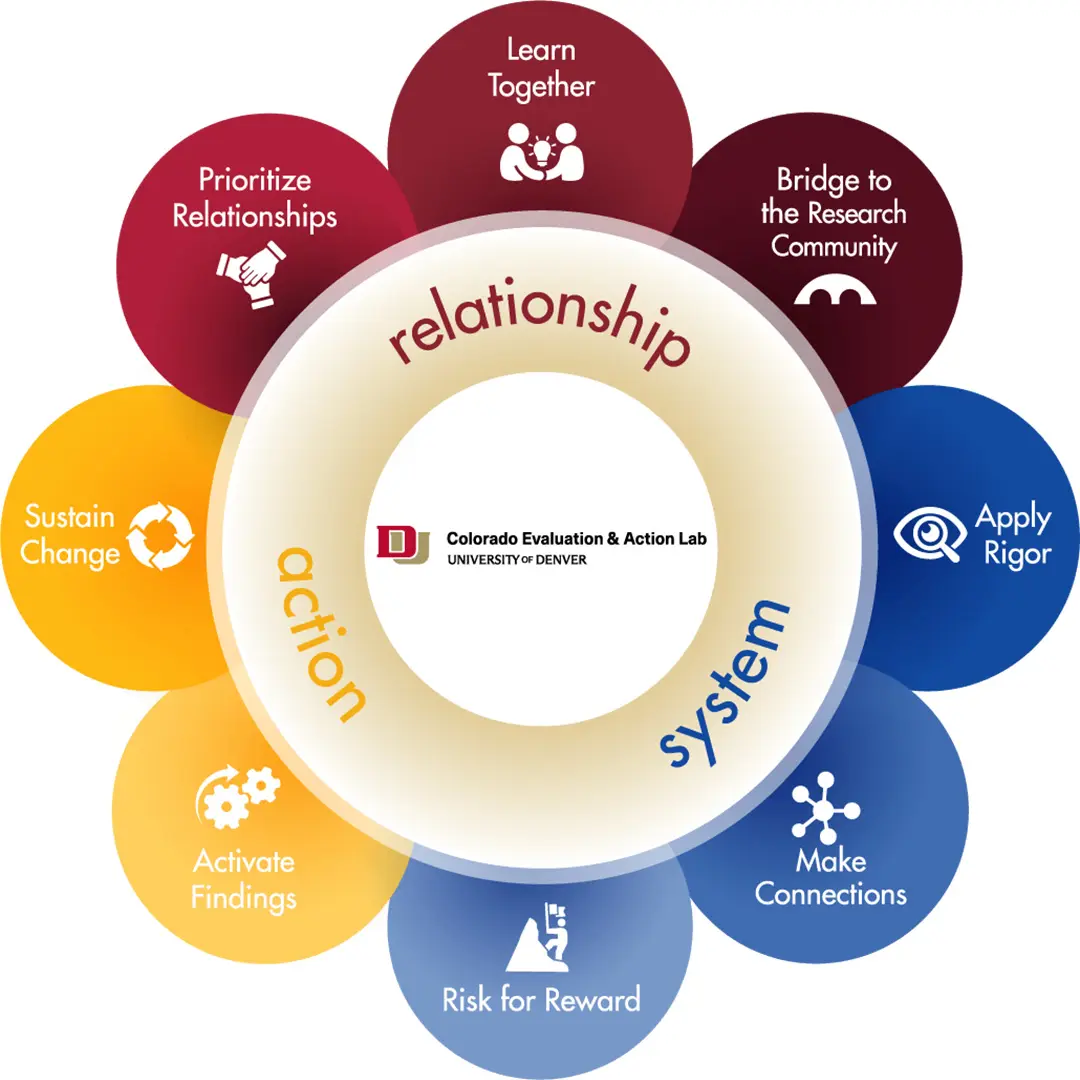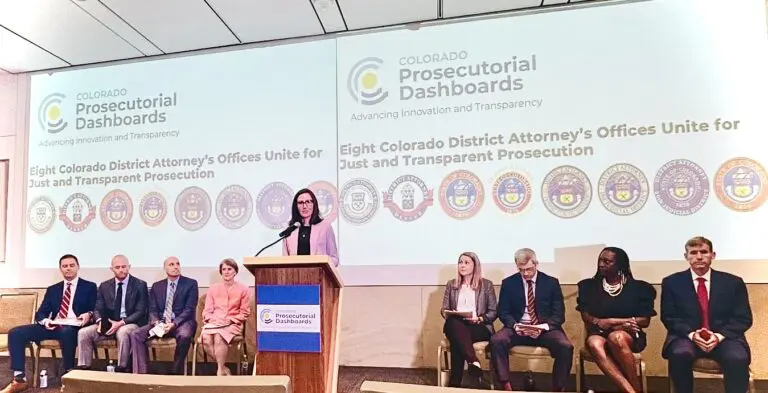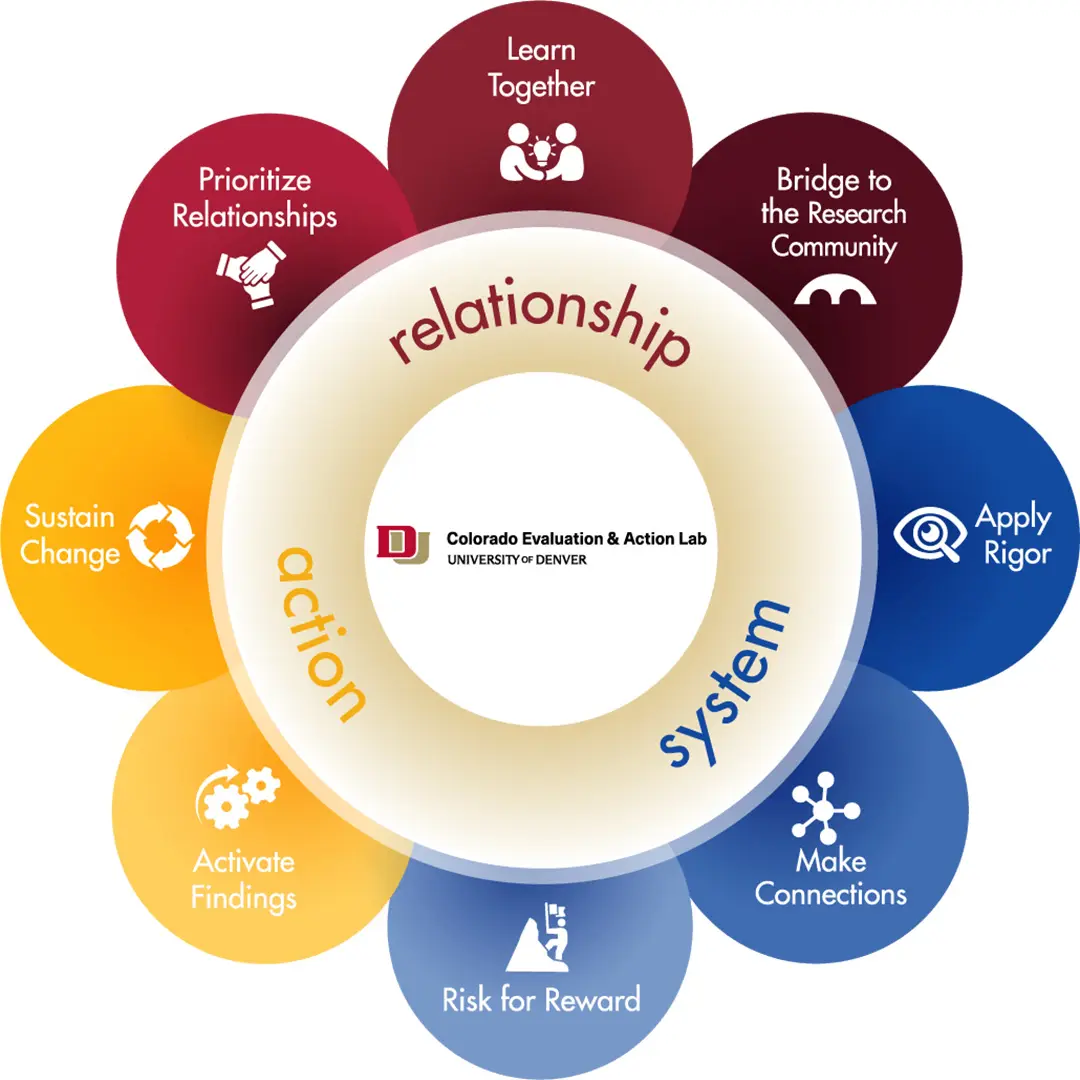Essential Elements: Activate Findings

Celebrating the Fifth Anniversary of the Colorado Evaluation and Action Lab!
This post is part of our special blog series to mark the fifth anniversary of the Colorado Evaluation and Action Lab. In each post, we highlight elements that are essential to our work with a broad range of government and community partners. The effectiveness of the work we undertake together is key to advancing systems and policies that strengthen opportunities to meaningfully improve the lives of Coloradans.
The goal of every Colorado Lab project is meaningful, timely action; we generate research evidence to inform practice and policy decisions. One of the most important elements to activating research findings is taking care to create, nurture, and maintain trusting relationships with and among partners (our first essential element). Throughout each project, we learn together with our partners, candidly and continuously discussing the data and building the structures and processes needed to support use of the results.
A good example is the Colorado Prosecutorial Dashboards project. Similar to most of the Lab’s work, the project provides opportunities to use data to inform decision-making and support continuous improvement. The project was sparked by Colorado District Attorneys’ (DAs) desire to have more information to ensure defendants and victims are being treated fairly and to be responsive to the public’s desire for greater transparency. The Colorado Lab partnered with Judicial Districts (JDs) across the state and the national Prosecutorial Performance Indicators project to develop data dashboards and conduct in-depth analyses to examine racial/ethnic disparities at points of prosecutorial discretion.

The eight JDs that volunteered to be a part of the pilot phase were diverse along many lines, including geographic location, political affiliation of leadership, and rural and urban communities. From the outset, the project team focused on building structures and processes to ensure that DA Offices could use their data dashboards to diagnose, discuss, and implement transformative action. Our approach included:
Having each JD establish a workgroup that includes diverse perspectives, levels of tenure, and informal and formal leadership roles. Workgroups are responsible for facilitating adoption, use, and sustainability of their dashboard.
Supporting each JD in communicating within their office, building both top-down (leadership) and bottom-up (line staff) support for the work.
Providing capacity-building opportunities for staff on how to understand, interpret, and translate data into action.
Setting clear expectations and providing support for each JD to conduct meaningful community engagement throughout the project period.
Hosting quarterly meetings that support JDs in asking questions and learning from each other and developing shared commitments.
Consistent with this definition, we recognize there is no such thing as objectivity. Each evaluator comes to a study with their own history, values, and experiences. As such, it is important that each of us recognize the ways in which our identities and perspectives inform our focus and approach. At each stage of a study, we strive to name our decisions and assumptions, and build in processes that hold us accountable and are transparent. We also acknowledge that data are not themselves objective or free of bias. This is because people are involved in all aspects of data generation, including deciding what data gets collected and from whom, how data are analyzed and interpreted, and where and how data are presented or shared.
Like all projects the Colorado Lab takes on, the dashboards work has an explicit focus on building trust and fostering collaboration. We make it clear that we (as external researchers) are not here to judge our partners on their work; rather, we support them in interpreting results and identifying action steps. They are the subject matter experts and the ones with the best understanding of their work and context.
In the dashboards project, trust building and collaborative dialogue led to all of the participating DAs issuing a shared public statement and jointly hosting a press conference. The collaborative process and positive public response has supported growing interest, with five additional JDs joining the project in January 2023 and the development of structures within the Colorado District Attorneys’ Council to support statewide scale.
At a time of increasing public scrutiny of the justice system, we are proud to support Colorado in leading the way, becoming the first in the nation to move toward statewide prosecutorial transparency and data-driven efforts to enhance effectiveness, efficiency, and fairness. Across our projects, we strive to work together with our partners to intentionally activate findings by investing in pathways that move results into opportunities for the people of our state and beyond.
Tune in next month for the final blog post in this series. We’ll focus on our essential element, Sustain Change, exploring the ways in which we strive to understand the core causes of problems, identify opportunities to foster systemic change, and activate stakeholders from across systems to achieve and sustain change.
Please tell us if there is an essential element that stands out to you based on the work we’ve done together. Do you have a story to share? Is there something about the Colorado Lab that you would like to learn more about? What are your hopes for the future of Colorado’s policy lab? We would love to hear from you; a celebration is more fun when it’s shared with those we’re making this journey with!

